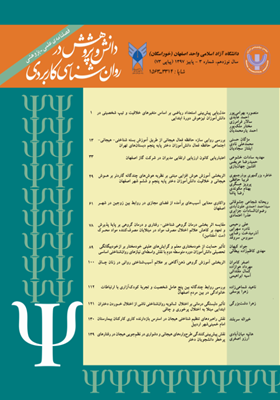نقش راهبردهای تنظیم شناختی هیجان در استرس بازدارنده کاری کارکنان بیمارستان امام خمینیشهر اردبیل
محورهای موضوعی : تربیتی
1 - گروه مدیریت، واحد پارسآباد مغان، دانشگاه آزاد اسلامی، پارسآباد مغان، ایران.
کلید واژه: بیمارستان امام خمینی, استرس بازدارنده کاری, تنظیم شناختی هیجان,
چکیده مقاله :
هدف این پژوهش نقش راهبردهای تنظیم شناختی هیجان در استرس بازدارنده کاری کارکنان بیمارستان امام خمینیشهر اردبیل بود. روش پژوهش از نوع آمیخته بود که در بخش کیفی از نوع تحلیل تم و در بخش کمی از نوع توصیفی و بهصورت پیمایش بود. جامعة آماری در بخش کیفی صاحبنظران حوزه روانشناختی، نخبگان دانشگاهی و کارشناسان خبره و در بخش کمی کارکنان بیمارستان امام خمینیشهر اردبیل بود. حجم نمونه در بخش کیفی، 24 نفر بهصورت هدفمند و در بخش کمی 217 نفر به روش نمونهگیری طبقهای تصادفی انتخاب شد. ابزار پژوهش در بخش کیفی مصاحبه و در بخش کمی پرسشنامه (تنظیم هیجان شناختی، گارانفسکی و همکاران، 2001)، و استرس شغلی اوسیپو، 2007)، بود. روایی ابزار بخش کمی (پرسشنامه) از نوع روایی سازه بود که بهوسیله تحلیل عاملی تأییدی سنجش و تأیید و برای تعیین پایایی از آلفای کرونباخ استفاده شد. یافتههای پژوهش در بخش کیفی، فهرستی از راهبردهای تنظیم شناختی هیجان شناسایی شد. همچنین یافتهها نشان داد که از میان 9 فرضیه، راهبردهای منفی تنظیم شناختی هیجان ازجمله، سرزنش خود، سرزنش دیگران، نشخوار ذهنی، فاجعهآمیز پنداری تأثیر مثبت و معنیداری، اما راهبردهای تنظیم شناختی هیجان سازگار ازجمله، پذیرش، توجه مجدد به برنامهریزی، تمرکز مجدد مثبت، ارزیابی مجدد مثبت، کماهمیت شماری، تأثیر منفی و معنیداری بر استرس بازدارنده داشتهاند.
The purpose of this study was to investigate the role of cognitive emotion regulation strategies in worker deterrent stress among employees of Imam Khomeini Hospital in Ardebil. The research method was a mixed type. Which was of a descriptive type in the qualitative section and surveying type in quantitative section The statistical population in the qualitative section was the experts in the field of psychology, academic elite and experts, and in the quantitative part it was the staff of Imam Khomeini Hospital in Ardebil. The sample size was 24 subjects in the qualitative section, and it was 217 in a random sampling method. The research instrument was interview in the qualitative section and in the quantitative part it was (Emotional regulation, Garanovsky et al., 2001), and occupational stress Osipo, 2007), Questionnaire. The validity of the quantitative tool (questionnaire) was a structural validity that was validated by confirmatory factor analysis and used to determine reliability Cronbach's alpha. Regarding the findings of the research in the qualitative section, a list of cognitive emotion regulation strategies including were identified. The findings also showed that among 9 hypotheses, negative strategies for cognitive emotion regulation such as self-blame, blame for others, mental rumination, catastrophic hypothesis have a positive and significant effect, However, adaptive emotional cognitive regulation strategies such as acceptance, re-attention to planning, positive re-focusing, positive re-evaluation, minor significance have a negative and meaningful effect on inhibitory stress.
اردکانی، س.، کنجکاو، ا.، و منفرد، س. (1391). واکاوی اثر مؤلفههای هوش عاطفی بر روشهای مدیریت استرس شغلی. مجلة مدیریت منابع انسانی، 60، 32-22.
ساعتچی، م. (1370). روانشناسی در کار سازمان و مدیریت. تهران: انتشارات مرکز آموزش مدیریت دولتی.
رابینز، آ. (1998). مبانی رفتار سازمانی. تهران: انتشارات مرکز علمی دانشگاه آزاد اسلامی.
صالحی، ا.، باغبان، ا.، بهرامی، ف.، و احمدی، ا. (1390). رابطه بین راهبردهای شناختی تنظیم هیجان و مشکلات هیجانی با توجه به عوامل فردی و خانوادگی. فصلنامه مشاوره و رواندرمانی خانواده، 1(1)، 18-1.
عبدی، س.، باباپور، خ.، و فتحی، ح. (1389). رابطه سبکهای تنظیم هیجان شناختی و سلامت عمومی دانشجویان، 8 (32)، 264-258.
عیسیزادگان، ع.، جناآبادی، ح.، و سعادتمند، س. (1389). رابطهٔ بین راهبردهای تنظیم شناختی هیجان، خلاقیت هیجانی، عملکرد تحصیلی با بهداشت روانی در دانشجویان. مجله روانشناسی، 7 (12)، 92-71.
فقهی فرهمند، ن. (1381). مدیریت پویای سازمان. تبریز: انتشارات فروزش.
گریفین، مورهد. (2001). رفتار سازمانی، ترجمه الوانی، مهدی و معمارزاده، غلامرضا. (1374). تهران: انتشارات مروارید.
لک، ز.، معاضدیان، ف.، حسینیالمدنی، ع.، و صداقت، م. (1391). اثربخشی آموزش مدیریت استرس به شیوه شناختی رفتاری بر کاهش اضطراب معتادان مبتلا به اختلال اضطراب فراگیر. مجله روانشناسی، 2 (11)، 36-12.
Ballenger, J. E., Davidson, J. R. T., Lecrubier, Y., Nutt, D. J., Borkovec, T. D., &Rickels, K. (2001). Consensus statement on generalized anxiety disorder from the international consensus group on depression and anxiety. Journal of Clinical Psychiatry, 62, 53-58.
Brown, M., & Beverly, C. (2008). The relationship of stress and coping ability to incidence of diseases and accidents. Journal of Psychosomatic Research, 25(4), 43-54.
Garnefski, N., &Kraaij, V. (2006). Cognitive emotion regulation questionnaire development of a short 18-item version (CERQ-short). Personality and Individual Differences, 41, 1045–1053.
Gross, J. (2001). Emotion regulation in adulthood: Timing is everything. Current Directions in Psychological Science, 10(6), 214–219.
Gross, J., & Munoz, R. F. (1995). Emotion regulation and mental health. Clinical Psychology – Science & Practice, 2(2), 151–116.
Gross, J. (2008). The emerging field of emotion regulation: An integrative review. Review of General Psychology, 2(7), 271-299.
Jimenez, S., Niles, B., & Park, L. (2010). A mindfulness model of affect regulation and depressive symptoms: Positive emotions, mood regulation expectancies, and self acceptance as regulatory mechanisms. Personality and Individual Differences, 49, 645–650.
Ochsner, K., & Gross, J. (2005). The cognitive control of emotion. TRENDS in Cognitive Sciences, 9(5), 242–249.
Olak, K. A., Garnefski, N., &Kraaij, V. (2007). Adolescents caught between fires: Cognitive emotion regulation in response to war experiences in Northern Uganda. Journal of Adolescence, 30, 655–669.
Parkinson, B., &Totterdell, P. (1999). Classifying affect-regulation strategies. Cognition and Emotion, 13(3), 277–303.
Salovey, P., Mayer, J. (2002). Emotional intelligence. Imagination, cognition, and personality, 9(3), 185-211.
Sarni, C. (1998). Issues of cultural meaningfulness in emotional. Developmental Psychology, 34, 647- 658.
Wells, A. (2007). Cognition about cognition: met cognition therapy and change in generalized anxiety disorder and social phobia. Cognitive and Behavioral Practice, 14(1), 18-25.
_||_

